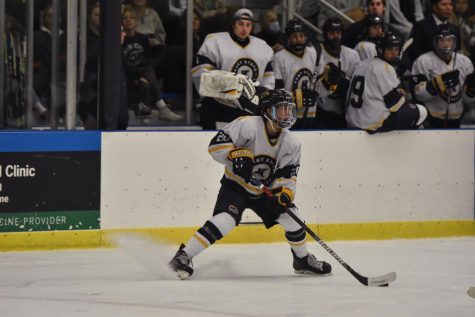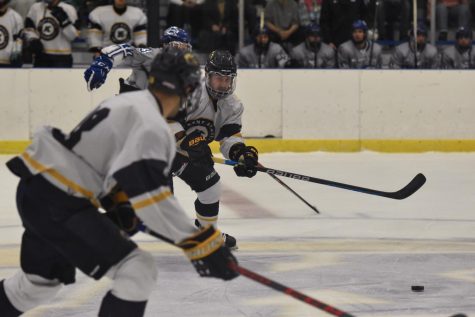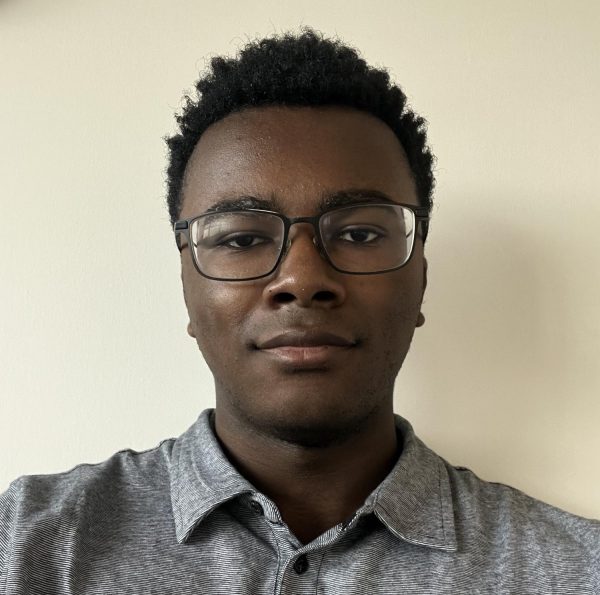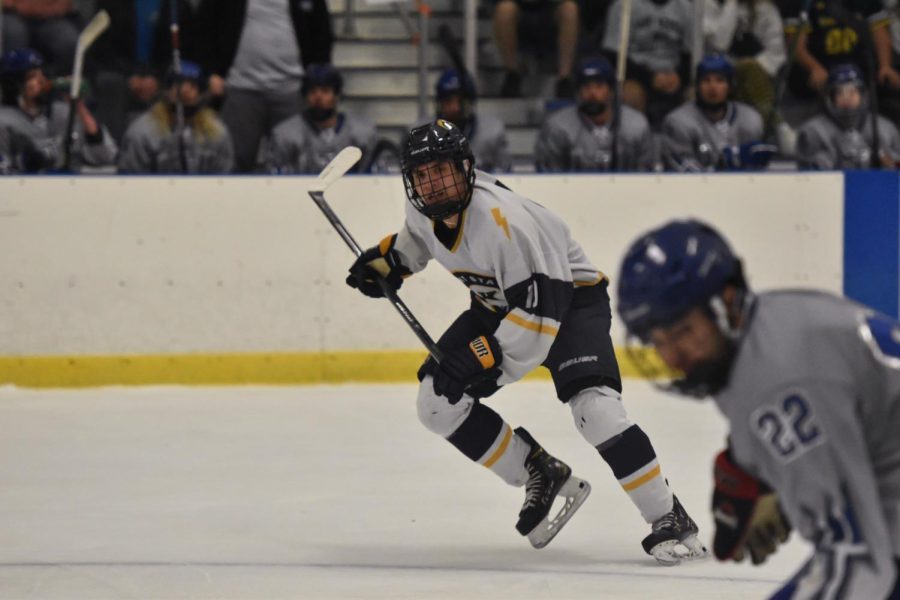A culture of collaboration: How Zachary Nowak works to give players a voice on KSU’s hockey team
A Kent State hockey team member chases his Lawrence Tech opponent down the rink.
When Zachary Nowak became coach of Kent State’s Division I hockey team two years ago, he knew he wanted to build a different kind of culture.
Nowak has been affiliated with Kent State hockey for nearly a decade.
He was a player on the team from 2010 to 2015, an assistant to former coach Jim Underwood from fall 2015 to 2019 and coach of KSU’s Division III team during its first year in 2020. His experiences led him to a different coaching style.
“We wanted to make sure that there wasn’t this authoritarian figure standing over the guys,” Nowak said. “We wanted to make sure that we created a culture where guys feel like they can have a voice and feel like they can share things, and don’t need to be afraid to make mistakes. We want them to make some mistakes because that’s a part of the learning process.”
A team culture, senior Zachary Barnes said, is essential for any team.
“If you don’t have a culture, then you have a bunch of individuals trying to play a team sport,” he said. “Identifying that culture gives everyone something to work for.”

Nowak’s way of practicing and building this culture takes a more new-aged approach.
“Nowak is very researched-based,” Barnes said, “We have a couple of specific things that we want to work on during the week, but he is also more open to comments.”
Nowak started weekly captain meetings and monthly leadership meetings — which include class representatives, coaches and captains — to “give the guys more of a voice.”
This season, seniors Zachary Zweirecki, Jake Friedman, Tommy Kilway and Barnes are team captains.
“We started doing these things to have the guys feel like they’re a part of what we’re all trying to do,” Nowak said. “It doesn’t mean that we, as the coaching staff, will always agree and move forward exactly with what they’re saying. But we want to make sure they feel heard and that we’re listening to them.”
Senior Tommy Kilway described Nowak as “encouraging.”
“Nowak really wants us to be creative on the ice,” Kilway said. “I feel like that’s really been helping us a lot.
“Under past direction, if something you tried didn’t work out, the coach would be sure that you’d hear about it. Nowak actually understands that when you try new things, you’re not going to get it every single time, and that change has been huge. Kids aren’t afraid to try new things.”
The life skills of hockey
Nowak said he focuses on promoting “effective communication, problem-solving and creativity” on and off the ice.
“When the boys hit the real world, they’re going to have to figure out problems on their own, and they’re going to have to solve problems with and without help,” he said.“I hope when the boys leave our program, they understand what it means to communicate and what it means to work through conflict. That’s what the sport taught me.”
Barnes said hockey teaches many life skills.
“Hockey teaches working within a team and learning your role,” he said. “That’s something you carry with you for the rest of your life.”
Barnes said he hopes to use his experience to help the younger men.
“The experience of playing hockey has matured me,” Barnes said. “It has allowed me to give my knowledge to the young guys coming in, especially the freshmen. They come to me with questions that they might have. I think my maturity shows in helping them.”

During the team’s Duquesne game Nov. 19, which the Flashes lost 8-2, Barnes described he stepped up with this maturity.
“We had a few players talking trash,” Barnes said. “They were getting upset, and I had to tell them, ‘When you’re losing this bad, you can’t be trash-talking. You have to take it and go from there.’ Because if we’re losing this bad, you have no right to talk any trash.”
The KSU family
When players talk about the team, they often use the word “family.”
Most of them have been playing on teams since they were four years old. Junior Jack Kinsman said Kent State stands out from the rest.
“The second I got here, the guys really welcomed me in – and I’ve loved it,” said Kinsman, a transfer student from Erie Community College. “I’ve played on six or seven teams, and I played on a few teams where it really felt like a clique, but Kent State feels like a family.”
Kinsman said this bond helps the team on the ice.
“Having a good group of guys helps us to have more of a team-based mentality than a me-first mentality,” he said. “Being able to play with these guys has helped me look at hockey as more of a team-style play.”
The team meets for dinners at Nowak’s house and goes bowling together before games.
“Doing things outside the rink helps a lot,” Barnes said. “Something we are trying to do more of is developing the team chemistry and make sure everybody’s buying into what we are trying to do here at Kent State hockey.”
Kilway said the team is the main social group for its players.
“There’s a lot of people that come here and want to join a fraternity,” he said. “You don’t need to when you’re on this team. We’re always dealing with stuff together. We’re more than just a hockey team.”
Mia Cadle is a reporter. Contact her at [email protected].

Matthew is a senior photography major and The Kent Stater's visuals editor. He has a passion for photography and traveling.
Contact him at [email protected].



